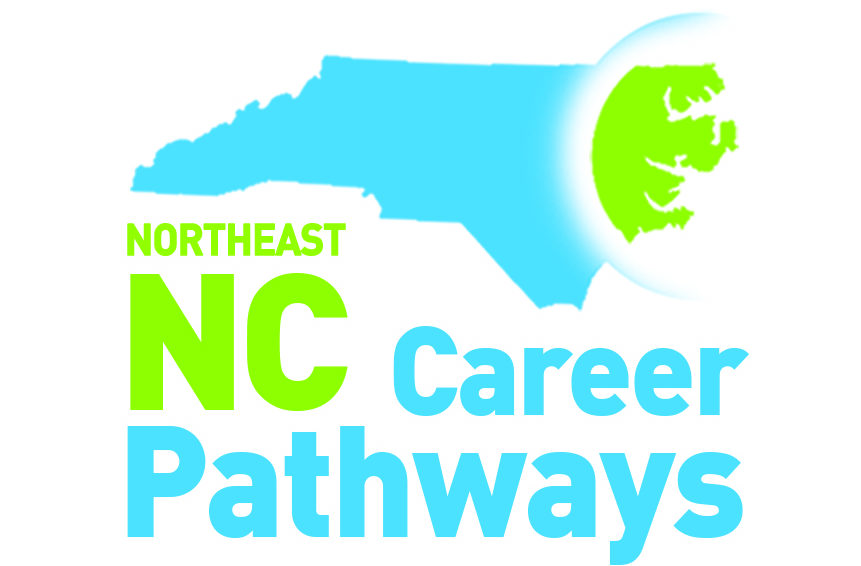Snippets of conversation and intermittent chuckles fill the dimly lit room at the NC Telecenter in Martin County, considered to be the mid-point for those traveling from across the northeast. Gathering from the far-flung regions of Northeastern NC for a shared purpose, a common goal. These regional gatherings put folks in the room together, who might not otherwise know or care much about what the others are doing. In the Northeast though, it’s different. They recognize the need to share best practices, collaborate where they can and continue pushing for the growth and development of a region which has been long left behind.
On the heels of Harvard’s Pathways to Prosperity report, a small collection of counties in Northeastern NC began a pilot project in the summer of 2012. Focused on the need for a skilled workforce, and recognizing the need for collaboration, this group swiftly expanded to 20 counties. As regional conveners, the three Workforce Development Boards agreed to become intermediaries for the project. Supporting the efforts of developing a large regional partnership focused on career pathways became the goal.
Over the past decade, this partnership has grown to include local school districts, community colleges and universities, NCWorks Career Centers, local employers and many community agencies and organizations from across the region. Four regional career pathways were developed and then certified by the NCWorks Commission: Advanced Manufacturing, Health Care, Business Support Services and Agriscience/Biotechnology. These include careers in engineering, welding, radiography, information technology, horticulture and so many more. These careers are in high-demand within our region and pay the sustainable wages needed for families to thrive.
In the early days of this work, Rob Boyce and Christy Harris were known as the “parents” of this initiative. They spent many hours discussing and organizing this work, debating over the finer points until they were satisfied. They leaned heavily on the other major contributors for feedback and refinement of the concepts and direction. What they created became the basis of the regional career pathways programs that eventually took hold across the state.
A decade later, it is amazing to see the growth of this partnership and the many successes of our partners in this work. Yet it can be difficult to directly connect the work and influence of the partnership on individual and small collaborative accomplishments throughout our region. What we can determine is the power of a cultural shift in mindset which has developed through the years. Our chairman, retired Workforce Board Director Walter Dorsey, is well-known among our partners for his directives to “leave egos at the door” while we work together to “break down the silos.”
After the initial work of listening to employer needs, aligning coursework and documenting the process, we moved our focus to implementation. Local areas, led by Community Colleges, have earned local implementation certificates for their work to customize pathways locally. Throughout our region we have worked with career counselors from secondary and higher education, workforce and community groups to move the needle towards quality guidance around career development and career pathways for youth and adults. We continue to offer our partners resources such as Traitify (a quick career and personality test), GADJ (easy lesson plans based on career development) and career ladder flyers and posters highlighting the career pathways.
These days, we are finally able to see deep implementation throughout the region. Organizations like S.T.E.P. (which is also celebrating a decade of collaboration this summer), local school systems and even Community Colleges are working together to provide opportunities for local students and job seekers. Their goals are to help our neighbors gain a better understanding of the sustainable careers available in their own backyards. The Workforce Development Boards are developing groundbreaking initiatives like #worklocal, which promotes local graduates in the halls of their former high schools. Rivers East Academy focuses on connecting teachers with local employers and Community College faculty. And NC Simulation Station, which offers career exposure through video games.
In Northeastern North Carolina, we developed more than just a definition of this work. We built more than just a collaborative working towards a shared goal. We innovated more than the elaborate implementation programs we celebrate. We established a culture. A culture of working together to solve problems and braid resources. A culture of reaching out for information and resources, and of providing information and resources to one another. A culture of understanding the grave issues facing our mostly socioeconomically distressed counties. A willingness to join forces to combat the high rates of outmigration from our region. This cultural mindset has created an atmosphere of connection rather than competition, and a willingness to do things differently instead of following the status quo.
On June 21st, we will host a celebration of our decade of partnership at the Bob Martin Ag Center in Williamston. We invite you to join us for this event, as we recognize the past, present and future of career pathways partnership in NENC. We will highlight many of our local partners who continue to implement this work and who embody the culture we’ve worked hard to establish throughout the region. And we hope you will be there to cheer us on!
